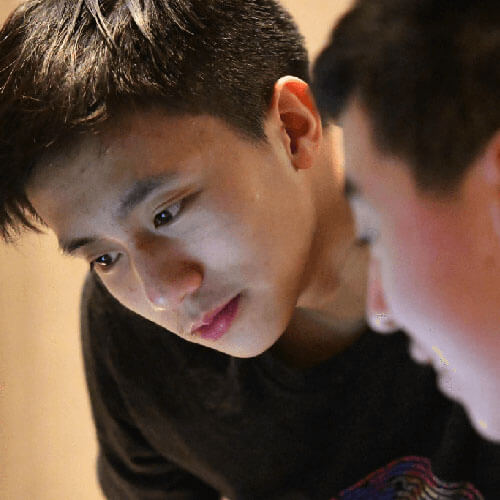Helping Your Student
Written by Mahek Acharya
So your child just joined debate or speech, and suddenly you’re hearing terms like “OO”, “contentions”, and “flow”. You want to help, but you’re not quite sure how and, more importantly, you want to make sure you’re helping in the right way. The truth is, there’s a fine line between being supportive and accidentally doing too much. Let’s talk about how to walk that line.
Understanding What Help Should Look Like
First things first: your role isn’t to write their speeches or construct their arguments. I know that’s tempting, especially when you see them struggling at 10 PM the night before a tournament. But here’s the thing: debate and speech are skills that students need to develop themselves. Your job is to be the scaffolding, not the builder. Plus, judges can usually tell when a speech wasn’t written by the student, and that’s not a conversation anyone wants to have.
Green Light: Ways You Should Definitely Help
Being the practice audience
- Listen to their speeches and cases as many times as they need
- Give honest feedback about clarity and delivery
- Time their speeches and let them know if they’re running over
- Point out when something doesn’t make sense to you as a listener
- Help them to pronounce difficult words so they are less likely to stumble over them
Logistical support
- Help them organize their tournament schedule and materials
- Make sure they have professional attire ready
- Drive them to practice and tournaments when/where applicable
- If an online class or tournament, provide a quiet and calm area for the computer
- Ensure they’re eating well and getting enough sleep during tournament weekends
Emotional support
- Celebrate their wins, whether that’s breaking to eliminations or finally nailing a tricky argument
- Help them process losses and disappointments constructively
- Remind them that growth matters more than trophies
- Be the calm presence when tournament stress gets overwhelming
Resource facilitation
- Help them find research databases or articles on their topic
- Connect them with people they could interview for their speech
- Provide access to practice materials or recording equipment
- Support their attendance at camps or workshops
Yellow Light: Proceed with Caution
There are some gray areas where your help can quickly cross from supportive to excessive. Here’s how to navigate them:
Brainstorming and editing
It’s totally fine to brainstorm topics or arguments with your student, but the ideas need to come from them.
- Ask questions like “What do you think about this issue?” or “How would you respond to that argument?” rather than telling them what to think.
- When it comes to editing, focus on big-picture feedback, “This section feels unclear” or “I lost track of your argument here”, rather than rewriting sentences for them.
Research assistance
You can absolutely help your student find sources, especially if you have expertise in research or a relevant field.
- There’s a difference between showing them how to use Google Scholar and actually doing the research for them.
- If you know the name of an organization that deals with a specific issue, you can mention the organization as a possibility. Example: The CDC or ACLU. However, leave any choices about searching for material to them.
- Teach them to fish; don’t just hand them the fish.
Speech structure
If your student is stuck on how to organize or structure a case, it’s okay to discuss organizational strategies or show them examples.
- The actual structure of their speech should be their decision.
- You can say, “Many speakers use a problem-solution format,” but you shouldn’t be outlining their entire speech for them.
Red Light: Stop Right There
Some things cross the line into doing the work for them. Here’s what to avoid:
Writing their content
- Drafting arguments, speeches, or cases for them
- Rewriting large sections of their work
- Putting words in their mouth that don’t sound like a teenager wrote them
Making strategic decisions
- Choosing which arguments to run in a debate round
- Deciding how to answer opponent’s arguments
- Selecting their interpretation or approach without their input
Over-coaching before rounds
- Giving them a script for how to handle every possible scenario
- Coaching them during prep time at tournaments (that’s their coach’s job)
- Pressuring them to argue positions they’re uncomfortable with
Real Scenarios: What Would You Do?
Scenario 1: The Night-Before Panic
It’s 11 PM before a tournament, and your student realizes their OO isn’t finished. They’re panicking and asking you to help write the conclusion.
Don’t do this: Write the conclusion for them while they go to bed.
Do this instead: Sit with them and ask questions. “What’s the main message you want to leave your audience with? What do you want them to do or think about?” Let them talk it out, then encourage them to write it themselves. If it’s truly too late, discuss with their coach about whether they should compete with an incomplete speech or withdraw, both are learning experiences.
Scenario 2: The Research Rabbit Hole
Your student has been researching for hours and can’t find evidence for a specific argument. They’re frustrated and asking you to find sources.
Don’t do this: Spend your evening finding all their sources and emailing them the links.
Do this instead: Spend 15 minutes showing them different search strategies, databases, or keywords they might not have tried. Then let them take it from there. Sometimes not finding evidence means the argument isn’t strong enough, and that’s okay: it’s a valuable lesson.
Scenario 3: The Unclear Speech
You’re listening to your student practice their OO, and honestly, you’re not sure what their point is. The whole thing is confusing.
Don’t do this: Reorganize the entire speech and tell them exactly what to say in each section.
Do this instead: Give them honest feedback. “I’m having trouble following your main argument. Can you explain to me in one sentence what you want me to understand?” Help them identify the problem, but let them solve it.
Trust the Process (And the Coach)
Here’s something important: your student’s coach is there for a reason. If you have concerns about your student’s progress or need guidance on how to help, reach out to the coach directly. They can give you specific advice tailored to your student’s needs and let you know if you’re crossing any lines.
Also, remember that struggle is part of the learning process. Watching your kid stress about a speech or lose a round they thought they’d win is hard, but these experiences are building resilience, problem-solving skills, and independence. Sometimes the best help you can offer is stepping back and trusting that they’ll figure it out.
Overall, your student joined debate or speech to challenge themselves, grow, and find their own voice. The best thing you can do is create space for that to happen while being their biggest cheerleader along the way.


